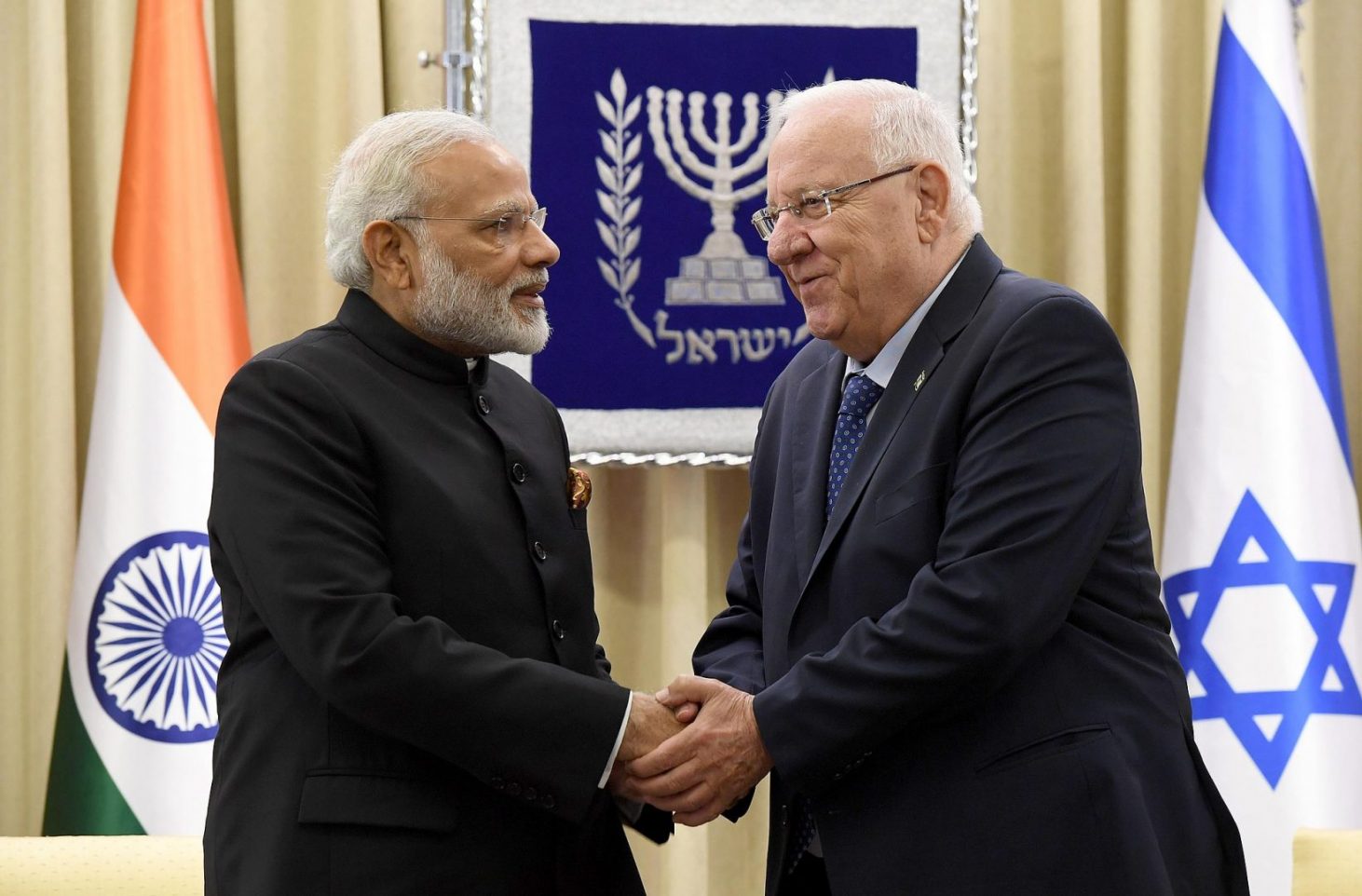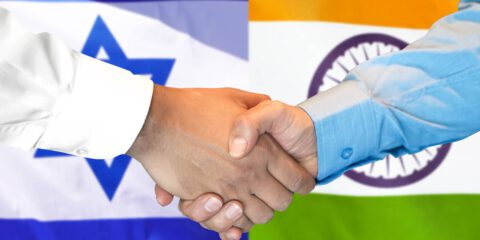India and Israel, located in different parts of the globe, share similar concerns about global developments and about threats that originate in the Middle East.
Introduction
India and Israel represent two ancient civilizations. The two share a British colonial past and were the first to become independent (in 1947 and 1948, respectively) in the post‐WWII decolonization wave. Both were born as the results of messy partitions and have maintained democratic regimes under adverse conditions ever since. While Israel has always been interested in having good relations with India, Delhi was reluctant to have full diplomatic relations with the Jewish state. Indian leaders had an anti-Zionist perspective.1 After independence they showed great sensitivity to the Arab bloc and to the large Muslim minority at home. It took over four decades for India to overcome its reluctance and to establish a fruitful bilateral relationship.
For India, better relations with Israel represents a major change in the Nehruvian traditional foreign policy that emphasized the leadership role in the Third World and that identified the Jewish State as part of the Western bloc. For Israel, good relations with India reflect awareness of structural changes in the international system as the center of gravity moves to Asia and the Pacific Rim. India is an extremely important protagonist that requires Israel’s utmost attention. Prime Minister Benjamin Netanyahu made it crystal clear in January 2017 that Israel’s foreign policy is pivoting toward Asia in a “very clear and purposeful way.”2
A Post-Cold War Relationship
The end of the Cold War provided an opportunity to change the anachronistic Indian policy toward Israel.3 The year 1991 was the turning point. After the collapse of the Soviet Union, which had been India’s main diplomatic and strategic ally during the Cold War, India was “forced to reorient its foreign policy to accommodate the changing international milieu.”4 The issue of relations with the Jewish state was also addressed. The diplomatic benefits of downgrading relations with Israel and maintaining a consistent pro-Arab voting record at the UN were evaluated and juxtaposed against an appraisal of the role of Israel in the Middle East and the possible benefits to be accrued by becoming closer to Jerusalem. 5
The decision to upgrade relations with Israel was also the product of the disappearance of several inhibiting factors. First, a change in trends in the political economy of energy sources lessened the leverage of the Arab bloc, and the oil-producing states in particular. By the end of the 1980s, fears of energy crises had subsided substantially. The oil market became a buyers’ market, diminishing the weight of Arab objections to the enhancement of relations with Israel. India also realized that efforts to divert Arab support for Pakistan on the Kashmir issue were ineffective.
Moreover, the Arab-Israeli peace process, reactivated by the Americans, in the aftermath of the 1991 Gulf War, further marginalized the objections of Israel’s regional enemies to third-party ties with Jerusalem. The October 1991 peace conference in Madrid, a formal gathering with Israel to which almost all Arab countries sent senior diplomatic delegations, served as a convenient pretext for hitherto reluctant states to develop a closer relationship with Israel. In the wake of the PLO support for Saddam Hussein, this organization and the Palestinian issue it represented received less support from Arab states and others, affecting also the traditional India support for the Palestinian cause that hindered a reassessment of relations with the Jewish state.6
Indeed, India signaled to Israel its willingness to gradually upgrade its relations. Yet, Israel rejected incremental steps and insisted on full diplomatic relations particularly before India could participate in the multilateral framework initiated at the Madrid Peace conference. New Delhi had many interests in the Middle East (oil, foreign workers, radical Islam) and showed great interest in the multilateral track of the Madrid Conference, particularly in the Arms Control and Regional Security committee. China decided to upgrade relations with Israel to secure its presence at the process generated by the American diplomacy and India did not want to fall behind.
The domestic political dynamics also played a role in the upgrading of Indo-Israeli relations: The decline in the fortunes of the Congress party and the ascendance of the Bharatiya Janata Party (BJP) in the Indian political system helped remove hesitations about Israel. The BJP’s nationalist and Hindu outlook made the Jewish state not so much of a diplomatic burden, but a potential ally against Pakistan and radical Islam. Indeed, the BJP convention of October 1991 introduced for the first time a clause calling for full relations with Israel. Normalization was also the result of the economic liberalization initiated by Prime Minister Narasima Rao of the Congress Party, which depended heavily on economic and technological interactions with the West. Israel was perceived as a well-integrated part of the new globalized economy that India wished to join.7
India was also sensitized to the political power of the Jewish organizations. Isi Liebler, at that time vice-president of the World Jewish Congress conducted series of talks with senior government officials. In parallel many American Jewish organization had an intensive dialogue with Indian representatives.8 As India attempted to secure a $2-5 billion loan from the World Bank and the International Monetary Fund, Washington became even more important. In fact, some of the Indian interlocutors that favored better relations with Israel invited pressure from the US on the issue of diplomatic upgrade with Israel to help them overcome the diplomatic inertia of their country.9 The official announcement of full diplomatic relations came on January 29, 1992. It was specifically linked to the upcoming visit of PM Rao to the UN National Security Council session and the US. New Delhi believed that announcing full diplomatic relations with Israel was conducive to a better atmosphere in the US due to the closeness between Washington and Jerusalem.
New Delhi soon realized that there was little cost to establishing full diplomatic relations with Jerusalem, neither at home nor abroad. Moreover, the two countries learned that they shared a similar outlook on their regional disputes and a common strategic agenda. For Israel, upgrade of relations with India together with similar steps by Russia, China, Turkey, Nigeria and additional Afro-Asian states in the early 1990s was an end to relative international isolation. This post-Cold War trend allowed for a gradual increase in emphasis on nourishing good relations with states in Asia, a continent of rising importance.
Strategic Glue
India and Israel display high levels of threat perception and share a common strategic agenda. Both have waged several major conventional wars against their neighbors and have experienced low‐intensity conflict and terror, as they are both involved in protracted conflicts characterized by complex ethnic and religious components not always well understood by outsiders. Both face rival states armed with weapons of mass destruction (WMD).
The two nations share a common threat: the radical offshoots of Islam in the greater Middle East. Israel regards parts of the Arab world, Saudi Arabia’s Wahabism inter alia, as hubs for Islamic extremism, while India views Saudi‐Pakistani relations with great suspicion. Moreover, India fears the Pakistani nuclear arsenal might ultimately fall into the hands of Islamic radicals.
For Israel, Islamic radicals in the Arab world and in the Islamic Republic of Iran constitute a constant security challenge. This challenge has become more acute with Iran developing aspiration for a nuclear option. The ISIS phenomenon has ramifications beyond the battlefields of Iraq and Syria, as its offshoots threaten the stability of Egypt and Jordan — Israel’s neighbors — and are also sources of concern in south and southeast Asia.
India has gradually overcome its inhibitions and engaged in security cooperation with Israel. In the wake of diplomatic normalization in 1992, then Indian Defense Minister Sharad Pawar admitted to having already been cooperating with Israel on counter‐terrorism. This cooperation involves exchange of information on the finances, recruitment patterns, and training of terrorist groups, and is conducted away from the public eye. The November 2008 Mumbai terrorist attacks underscored the need for better counterterrorism preparations in India and elicited greater cooperation with Israeli agencies.
Arms supply and technology transfer have become important components in the bilateral relationship. Initially, Russian failure to deliver promised weapons at expected prices and/or schedules led India to turn to Israeli companies to upgrade some of its aging Soviet platforms, such as its Mig‐21s and T‐72 tank fleet.
Difficulties in the development of weapons systems at home have led to the purchase of Israeli products and to partnership in developing advanced military technology. New Delhi purchased Israeli advanced radar and communications equipment, and turned also to Israel for portable battlefield radars, hand‐held thermals, night warfare vision equipment, and electronic fences to improve border monitoring. A long list of Israeli military items, such as ammunition, UAV parts, and even missiles (Spike anti‐armor, the Python‐4 air‐to‐air, naval Barak‐8 surface‐to‐air) are being produced in India.
The airborne Phalcon radar (mounted on the Russian IL‐76 transport aircraft) Airborne Early Warning and Control Systems (AWACS), and the long range Green Pine radar, are examples of high‐end items. The sale of the Phalcon by Israel to India required American approval, which was finally secured in May 2003. India signed a contract for the purchase of two additional Phalcon/IL‐76 AWACS valued at $1 billion during the November 2016 visit of Israel’s President Reuven Rivlin to India. Israel was the third‐largest arms supplier to India in the three years ending March 2016.
In April 2017, India signed a contract worth about $2 billion to procure anti‐tank missiles and air defense systems from the Israel Aerospace Industry (IAI). This was the largest order in Israel’s history. One month later, the IAI secured another contract for $630 million to supply Barak‐8 missiles for the Indian Navy. Both deals involve technology transfer and production in India. These deals are part of PM Modi’s $250 billion plan to modernize the armed forces by 2025 amid tensions with neighbors China and Pakistan.
The Indian‐Israeli nexus has various Indian Ocean implications, particularly in response to China’s growing presence. The Indian Ocean, where India is an important actor, has become an area of growing interest for Israel because of its apprehensions about Iran and Pakistan.
While India, a major player in the international system, has improved relations with Washington, New Delhi’s links with Jerusalem have the potential to smooth over some of the remaining difficulties in dealing with the US. Working with Israel also fits into the plan of PM Narendra Modi to deepen relations with the US given the US‐Israel friendship.
New Delhi believes its normalization of relations with Israel in 1992 had a positive effect on the American disposition toward India. The often‐exaggerated power of the Jewish lobby in America was appreciated in New Delhi. In the 1990s, the American Jewish organizations valued the importance of India for the US and for Israel, as well as the potential advantages of nurturing good relations with the Indian community in America, whose congressional power is on the rise. Many members of the Indian lobby, the US‐India Political Action Committee (USINPAC), which was formed in September 2002, expressed the desire to emulate American Jewish groups and showed interest in cooperation.
The Jewish and Indian lobbies worked together to gain the Bush administration’s approval for Israel’s sale of the Phalcon to India. Moreover, in July 2003, they were successful in adding an amendment to a bill giving aid to Pakistan that called on Islamabad to stop Islamic militants from crossing into India and to prevent the spread of WMD. In the fall of 2008, Jewish support was important in passing through the US Congress the US‐India nuclear deal, which allowed India access to nuclear technology for civilian use despite its not being a party to the Non‐Proliferation Treaty (NPT). For Israel, this was an important precedent for possibly receiving a similar treatment by the US.
The Modi Era
Since Narendra Modi and the BJP came to power in May 2014, his administration has shed its predecessors’ reservations about regular public discussions regarding India’s ties with Israel. Indeed, Modi arrived for a first ever Indian PM visit to Israel at the beginning of July 2017. This first trip to Israel by an Indian prime minister reflected the significant expansion in relations between the two countries that has taken place since the establishment of full diplomatic relations in 1992. The burgeoning relationship is based on a similar strategic agenda, buttressed by extensive defense ties.
It is worthy of note that Modi’s trip to Israel was not “balanced” with a visit to the Palestinian Authority, indicating that India has freed its relations with Israel from its historical commitment to the Palestinian issue. (He visited the PA on a separate trip on February 2018.) Indeed, India has occasionally modified its voting pattern at international organizations by refraining to join the automatic majority against Israel. Modi’s departure from the political correct symmetry pleased the Israelis and signaled that India decided to act on its national interests. Israelis hoped that Modi’s pragmatic approach will be emulated by high dignitaries to come to Israel from all over the world.
Israel went out of its way to extend a most warm welcome, underscoring the good personal chemistry between Modi and Israel’s PM Benyamin Netanyahu. The manner Israel managed the visit was well appreciated by Indians. “Israel is a real friend and I have really felt that feeling of kinship. I feel absolutely at home here,” Modi said during a meeting with President Reuven Rivlin in Jerusalem. He emphasized the very warm reception was “a mark of respect to the entire Indian nation comprising 1.25 billion people.”10
The visit of Prime Minister Modi reflects the success of the reorientation of Israel’s foreign policy. Recognizing that there is a shift in the distribution of power in the international system and that the Asia-Pacific region gradually becomes the center of gravity for international interactions, Israel has paid greater attention to Asia. Within such a perspective, Israel courted India, a rising global power located in that region. India, for its own reasons, responded positively, turning into a most important market for Israel’s defense exports.
Israel’s export policy is flexible, meeting Indian demands for technological transfer and offsets. The India-Israel Joint Statement at the end of Modi’s visit in Israel hailed the defense cooperation, noting that India and Israel agreed that “future developments in this sphere should focus on joint development of defense products, including transfer of technology from Israel, with a special emphasis on the ‘Make in India’ initiative.”11
Beyond the billions of dollars in defense deals, India and Israel share a common strategic agenda. Indeed, the first paragraph of the India-Israel joint statement states that that the friendship between the two states has been raised to “a strategic partnership.” This is a significant definition. Modi explained “Israel and India live in complex geographies … We are aware of strategic threats to regional peace and stability … Prime Minister Netanyahu and I agreed to do much more together to protect our strategic interests…”
In the joint statement, both prime ministers reiterated their strong commitment to combat global terror. “They stressed that there can be no justification of acts of terror on any grounds whatsoever.” The Working Groups of the two states on Homeland and Public security were encouraged to implement the agreements in an efficient and effective manner. Similarly, cyber security was recognized as an important area for enhanced cooperation.
While national security issues, including defense contracts, are an important facet of the bilateral relations, it is only one component. The joint statement mentions a myriad of items of mutual interest in the civilian sphere. Looking to deepen ties the two PMs presented a series of agreements between India and Israel for cooperation in the field of space, water management, agriculture, science and technology. In addition, the two countries decided to create a $40 million innovation fund to allow Indian and Israeli enterprise to develop innovative technologies and products with commercial application.
The Modi visit was extremely well covered by the Indian and the international media. It was a great opportunity for Israel not to be seen through the prism of the Arab-Israeli conflict, but as technological superpower able to attract the attention of rising global powers such as India. Modi’s warmth toward Israel was a great public relations benefit for Israel and also a welcome promotion for Israeli products.
The many Indian journalists that accompanied Modi were also an important tool to present Israel as an attractive tourist destination. Netanyahu expressed his wish to see many more, “but not too many,” Indians coming for vacation to the Jewish State.
Netanyahu touted Israel’s growing ties with the second-most populous country in the world. This visit serves him well in refuting the accusations from the opposition that his foreign policy leads to the isolation of Israel in the international arena. He could convincingly argue that Israel has become a preferred partner in the international community because it has many things to offer in the defense and civilian spheres.12
Netanyahu accepted an invitation from his Indian counterpart to visit Delhi. The visit took place in January 2018, being the second Israeli PM visiting India (Ariel Sharon’s was the first visit in 2003). Accompanied by a 130-member business delegation, Netanyahu attempted to further deepen ties in trade and defense. This visit was also an opportunity check the progress made, to identify the blocks hindering the implementation of the agreements and to further solidify the ties between the two countries.
Conclusion
The Indian-Israeli burgeoning relationship is a Post-Cold war development. It reflects complementary interests. Israel was successful to capitalize on specific Indian needs to establish itself as an important defense partner. The huge Indian civilian market had a huge potential for Israeli firms in the area of agriculture, communications and health services. This remains to be effectively tapped by Israeli businessmen.
Interestingly, Modi’s visit to Israel coincided with a raise in Sino-Indian tensions in the Sikkim border area, underscoring India’s threat perceptions and military needs. Israel, on a different scale, is concerned about Chinese behavior that challenges its main ally – the US. Indeed, two strategic developments of the 21st century are likely to strengthen the strategic glue between India and Israel: the decline of the US and the rise of China. In the Middle East, the Obama administration projected weakness and encouraged Iran’s quest for hegemony. US weakness inevitably has ripple effects in other parts of the globe. Indeed, Asian states view the declining American role with concern. It is not clear yet whether new American President Donald Trump will adopt a more assertive foreign policy than his predecessor or how he will confront China, as he displayed isolationist impulses during his election campaign and afterwards.
India and Israel, located in different parts of the globe, still share similar concerns about global developments and about threats that their origin is in the Middle East.
[1] P.R. Kumaraswami, Squaring the Circle. Mahatma Gandhi and the Jewish National Home (Delhi: KW Publishers, 2018).
[3] Efraim Inbar, “The Indian-Israeli Entente,” Orbis, 48 (Winter 2004).
[4] H. V. Pant, “India-Israel Partnership: Convergence and Constraints,” MERIA Middle East Review of International Affairs, 8(4), 2004, p. 2.
[5] For the upgrading of Indo-Israeli relations, see Moshe Yager, “How Was Normalization Achieved in Indo-Israeli Relations?” Nativ (Hebrew), No. 90 (January 2003), pp. 1-11; Giora Bachar, “The Normalization in Indian-Israel Relations,” in Moshe Yegar, Yoseph Govrin and Aryeh Oded, Ministry For Foreign Affairs. The First Fifty Years (Hebrew) (Jerusalem: Keter, 2002), pp. 543-49.
[6] P.R. Kumaraswamy, India’s Israel Policy, (New York: Columbia University Press, 2010), p. 240.
[7] P.R. Kumaraswami, “India-Israel: Emerging Partnership,” Journal of Strategic Studies, vol. 25, no. 4 (December 2002), pp. 198.
[8] Interview with Isi Liebler, Jerusalem.
[9] Moshe Yegar, The Long Journey to Asia. A Chapter in the Diplomatic History of Israel (Hebrew) (Haifa: Haifa University Press, 2004), p. 165.
[10] jpost.com/Israel-News/Modis-Visit/Rivlin-hails-Modi-as-one-of-worlds-greatest-leaders-of-democracy-498819
[11] For the text see http://www.mea.gov.in/bilateral-documents.htm?dtl/28593/IndiaIsrael+Joint+Statement+during+the+visit+of+Prime+Minister+to+Israel+July+5+2017
[12] “Jerusalem’s Decreasing Isolation,” Middle East Quarterly, 20 (Spring 2013). meforum.org/articles/2013/jerusalem-s-decreasing-isolation
photo: Mark Neyman / Government Press Office (Israel) [CC BY-SA 3.0 ], via Wikimedia Commons





 - בניית אתרים
- בניית אתרים